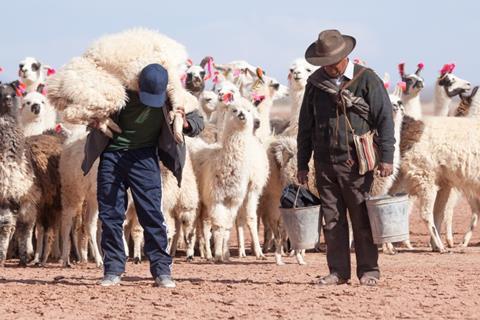
Bolivian director Alejandro Loayza Grisi’s Utama won both the best film prize and the audience award at the 21st edition of the Transilvania International Film Festival which closed yesterday, Sunday June 26.
Distributed internationally by Alpha Violet, the Bolivian-Uruguayan-French co-production about an elderly Indigenous man trying to survive in the Bolivian highlands, premiered earlier this year in Sundance where it received the Grand Jury Prize in the World Cinema: Dramatic Competition. It is Grisi’s debut feature.
Iceland’s Gudmundur Arnar Gudmundsson won the best director prize for his second feature Beautiful Beings. He had been awarded the same prize in 2017 for his debut Heartstone.
The special jury award was presented to Lithuania’s Dovile Sarutyte’s Feature Film About Life, and the best performance award was shared by Laura Müller and Schemci Lauth for Julien Hilmoine’s two-hander The Night Belongs To Lovers.
In addition, the jury gave a special mention to Eszter Csonka for her portrayal of a female bodybuilder ready to sacrifice everything to win the world championship in László Csuja and Anna Nemes’ Gentle.
The international jury was comprised of Romanian director Bogdan George Apetri, Icelandic actress and theatre director Halldóra Geirhardsdóttir, Carlos Rodríguez Ríos of the Barcelona-based distributor Noucinemart and D’A Film Festival, Turkish producer and industry consultant Gülin Üstün, and Serbian film director Srdan Golubović.
Ongoing renovation work at the awards ceremony’s traditional venue in Cluj-Napoca’s historical opera house meant the closing ceremony was held for the second year running on the city’s main Unirii Square.
The awards were handed out before the lights went down for the open-air screening of Mariano Cohn and Gastón Duprat’s comedy Official Competition which closed the festival.
Romania Days
Bogdan George Apetri’s Miracle won the best film award in the Romanian Days strand while Alina Grigore’s Blue Moon was named best debut by the jury of film critic/festival programming adviser Barbara Wurm, Gaga Chkheidze, director of the Tbilisi International Film Festival, and Norwegian film curator Kjell Runar Jensen.
Victor Canache’s feature debut The Goat With Her Three Kids, based on a popular gory folk tale, was voted the most popular Romanian film at the festival by the TIFF audience.
A special mention was given to Stefan Constantinescu’s feature debut Man And Dog which had been developed at the First Films First training programme for Southeast European filmmakers in 2017 and had premiered at Göteborg in January.
The Fipresci prize for the best film in the Romanian Days competition went to Immaculate by Monica Stan and George Chiper-Lillemark.
The newly- created What’s Up, Doc? Award for films that blur the line between fiction and documentary was presented to Sebastian Mihailescu’s You Are Ceausescu To Me. It will be released in Romanian cinemas on 29 July.
Industry winners
The ninth edition of the Transilvania Pitch Stop (TPS) saw 10 projects from Romania, the Republic of Moldova, Bulgaria, Ukraine, Turkey, and Serbia being presented onsite to an audience of invited international professionals.
The international jury of Oscar Alonso (Latido Films), Patra Spanou (Patra Spanou Film) and Yohann Cornu (Damned Films) gave the Chainsaw Europe Postproduction Award with services to the value of €25,000 to Panagiotis Charamis’ neo-Western Avanos.
Sofia-based Kristina Spassovska’s 40, Maria Luisa Boulevard, which had also been in Cluj to participate in First Films First’s training module on script development, was awarded the €5,000 Transilvania Pitch Stop Development Award sponsored by Avanpost and TIFF.
Turkish filmmaker Burcu Aykar and her producer Müge Özen picked up the € ,500 Moldova National Film Center Award for As Shadows Fade, while the Villa KULT Development Award to the amount of € 500 to cover development and research expenses was given to Moldovan director Maxim Baraliuc’s Light.
In addition, this year’s CoCo Award, which offers the winner a five-day residency at Germany’s Connecting Cottbus co-production market at the beginning of November, went to Where Elephants Go? by co-directors Gabi Sarga and Catalin Rotaru.
One disappointment was the physical absence in Cluj of Ukrainian director Andrii Ivaniuk and his producer Volodomyr Filippov of Insightmedia to pitch their project about domestic violence, Sasha – Oleksanda. Instead they sent a detailed video pitch and were able to have online one-to-one meetings.
Two representatives of the Ukrainian film community were nevertheless able to meet international colleagues in Cluj: producer Olga Zhurzhenko of Ukrkino travelled from her new base in Warsaw and ESSE Production House’s Natalia Libet was at TIFF to coordinate the second edition of the First Cut Lab at the beginning of the week.
Next moves
Festival president Tudor Giurgiu told Screen he is now in final stages of postproduction for his latest feature film as director, Freedom (previously known as Sibiu ‘89), co-produced by Libra Films with Hungary’s Joszef Berger of Mythberg Film.
Based on real events from the Revolution that overthrew the Communist regime, the drama re-enacts a little-known story about those chaotic days when violent civil unrest led to a bloody confrontation between the Army’s forces and Ceausescu’s militia and secret police.
In addition, Giurgiu is working on the documentary Nasty about the legendary Romanian tennis player Ilie Nastase and had been able to interview Boris Becker in London before the former German tennis ace began his prison sentence this spring.
The TIFF team will have little respite after the festival wraps in Cluj since they will again be organising a selection of the festival’s film programme to tour around Romania in the coming weeks to such towns as Timosoara and Sibiu.
The TIFF teams is also the driving force behind the creation of a new event, the Sunscreen Film and Arts Festival, at the Black Sea port of Constanta from September 8-11. A programme of around 30 films will be shown at open-air venues and indoor cinemas together with sidebars dedicated to children’s films, VR cinema, concerts and a film education strand.
















![[L-R]: Amanda Villavieja, Laia Casanovas, Yasmina Praderas](https://d1nslcd7m2225b.cloudfront.net/Pictures/274x183/6/4/1/1471641_pxl_20251224_103354743_618426_crop.jpg)








No comments yet